Today we're talking our first real look at Windows 11 performance with some Intel Core processors. There's a few reasons why we wanted to test using Intel's 10th and aksi lucah melayu terbaru11th gen CPUs first – of course, to see how much difference there is when compared to Windows 10 – but also to establish some baseline data that we can come back to in a few weeks with 12th-gen Alder Lake CPUs, which is meant to benefit from scheduling updates made with Windows 11.
As far as we're aware, Intel 10th and 11th-gen desktop CPUs should deliver comparable performance using either Windows 10 or Windows 11. But as always there seems to be conflicting reports, some claiming Windows 11 is much faster and others suggesting the opposite is true.
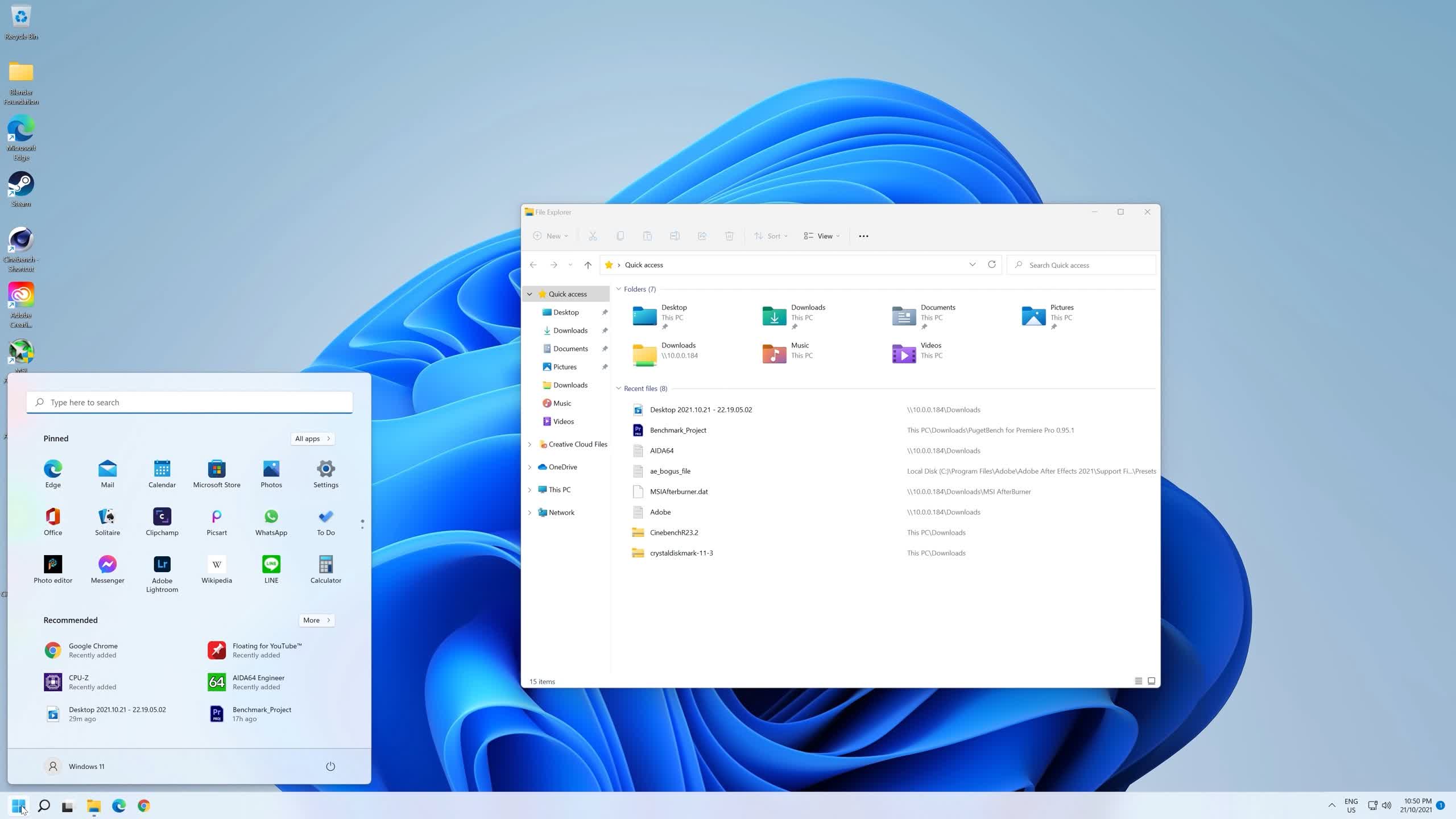
To find out what is what, we've tested over half a dozen configurations using the flagship Intel Core i9-11900K alongside an entry-level Core i3-10105F, which is a refreshed 10th gen part, featuring 4 cores with 8 threads. The idea is to see if there are any performance changes using either low-end or high-end hardware.
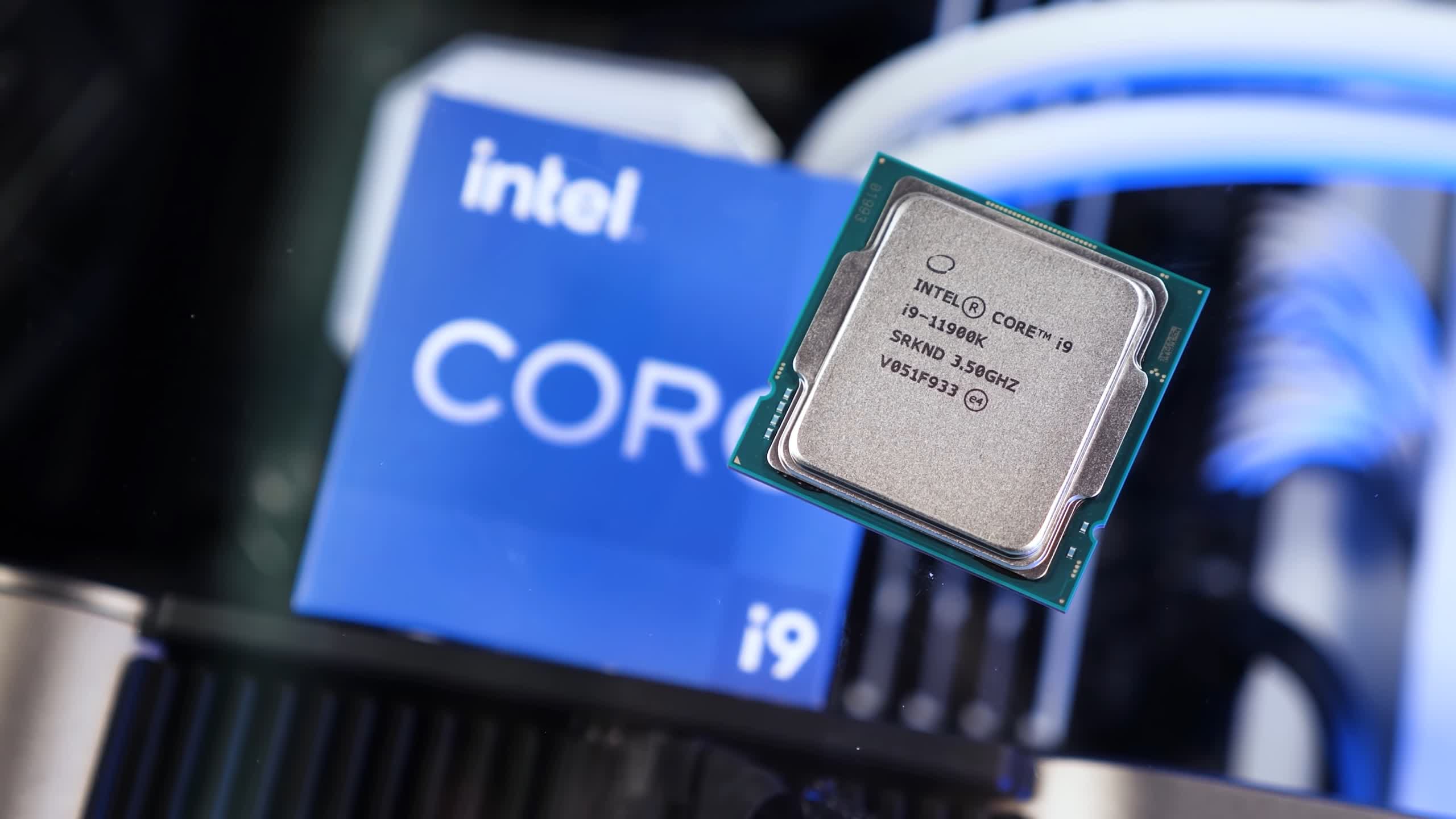
Now along with a fresh install of Windows 10 and Windows 11, we've also included a configuration based on a Windows 10 fresh install that was then upgraded to Windows 11. We should note that by fresh install we mean this is a recent install of Windows made on a brand new SSD, which is then loaded with all the applications we require for testing and diagnosing performance, so at that point we've installed as many (or more) applications and games than most of you will have installed at a given time.
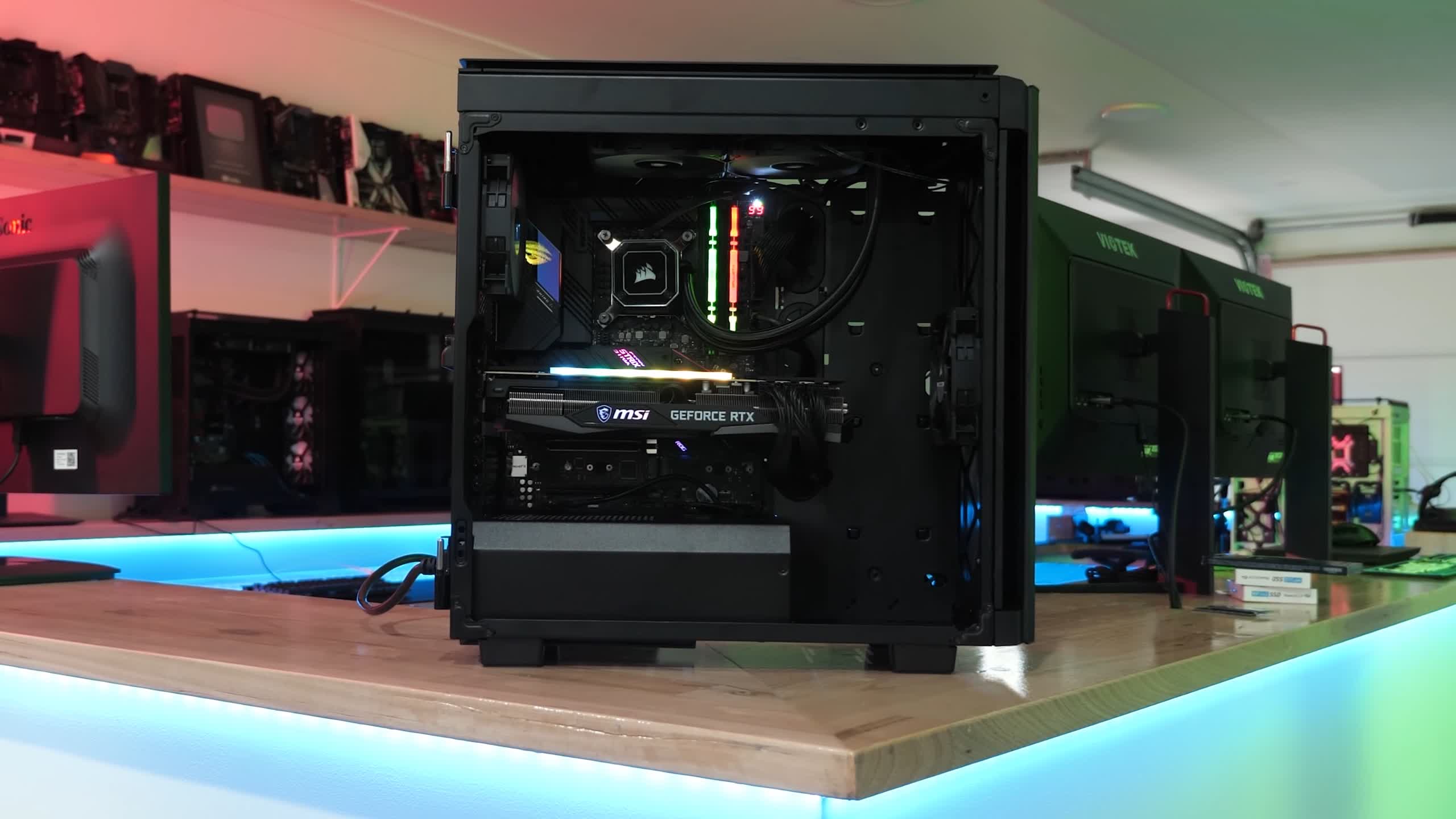
TeamGroup was gracious enough to send over a pair of their 8TB MP34Q M.2 NVMe SSDs. These tiny SSDs offer 8TB of high speed storage and we've got one for the Windows 10 testing and another for Windows 11, which allowed us to go back and forth to double and in some instances triple check results.
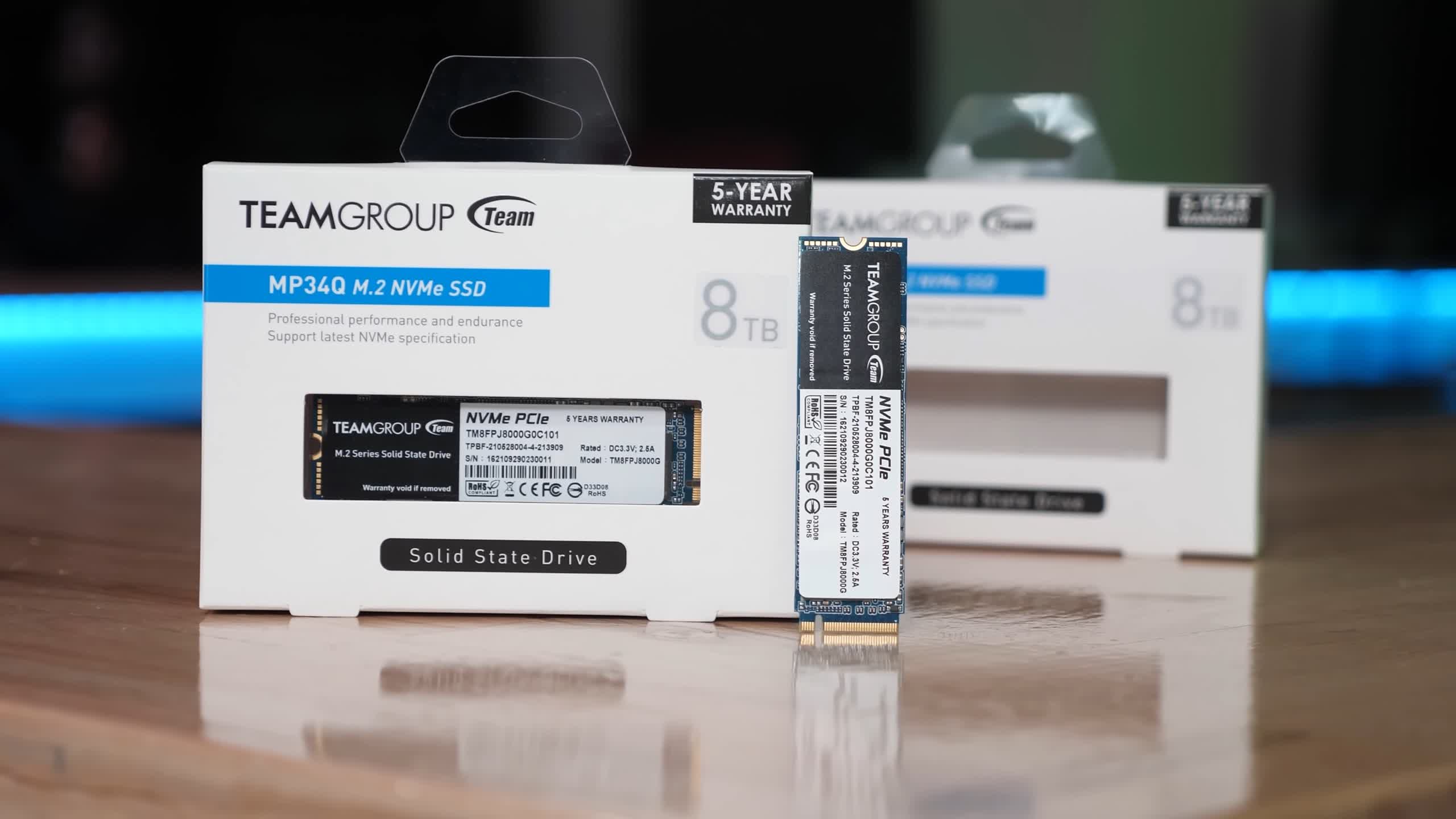
The drives offer read throughput of up to 3.4 GB/s with writes as fast as 3 GB/s and we'll be including some storage test results towards the end of the article.
A word about VBS
The fourth configuration we've included is one with Virtualization-Based Security (VBS) enabled. By default, our Windows 11 install disabled this feature, but it's been reported that on some desktop and laptop PCs, VBS is enabled by default and can tank gaming performance by up to 25%.
It should be noted that VBS isn't a new feature and it's certainly not exclusive to Windows 11. You can enable it on Windows 10, but we've never come across a single configuration where it's enabled by default.
To check if VBS is enabled, use Windows search, type 'MSInfo32' and hit Enter. Towards the bottom of the system info you'll find if Virtualization-Based Security is enabled or not. To toggle it on/off, enter the Windows Security menu, navigate to the Device Security tab and under the header "Core isolation" you'll find the ability to toggle disable VBS.
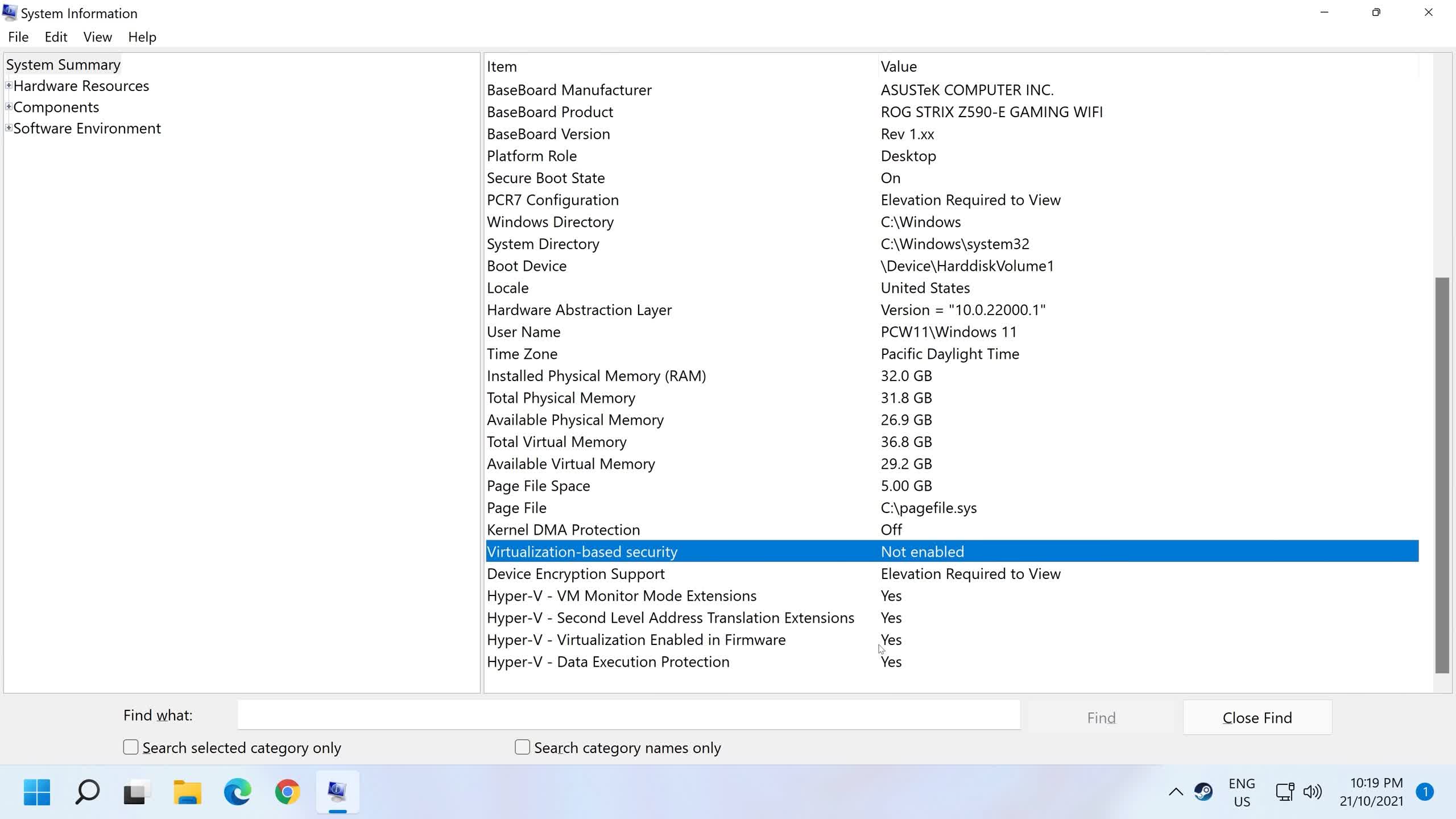
We don't feel this is a feature most desktop users will need or want to enable, and this is especially true for gamers. But we've run a separate configuration with it enabled just so you can see the performance impact.
For those of you wondering, VBS is an enterprise-class feature designed to secure corporate PCs by creating an isolated and secure region of memory from the normal operating system. Windows can use this 'virtual secure mode' to host a number of security solutions, providing them with greatly increased protection from vulnerabilities in the OS, and preventing the use of malicious exploits which attempt to defeat protections.
Going into the benchmark phase, our test systems used the Core i9-11900K and Core i3-10105F, both of which were installed on the Asus ROG Strix Z590-E Gaming WiFi motherboard using BIOS version 1007. For the memory, we've gone with a Crucial Ballistix DDR4-3200 CL16 kit, and for the graphics card the MSI RTX 3090 Gaming X Trio.
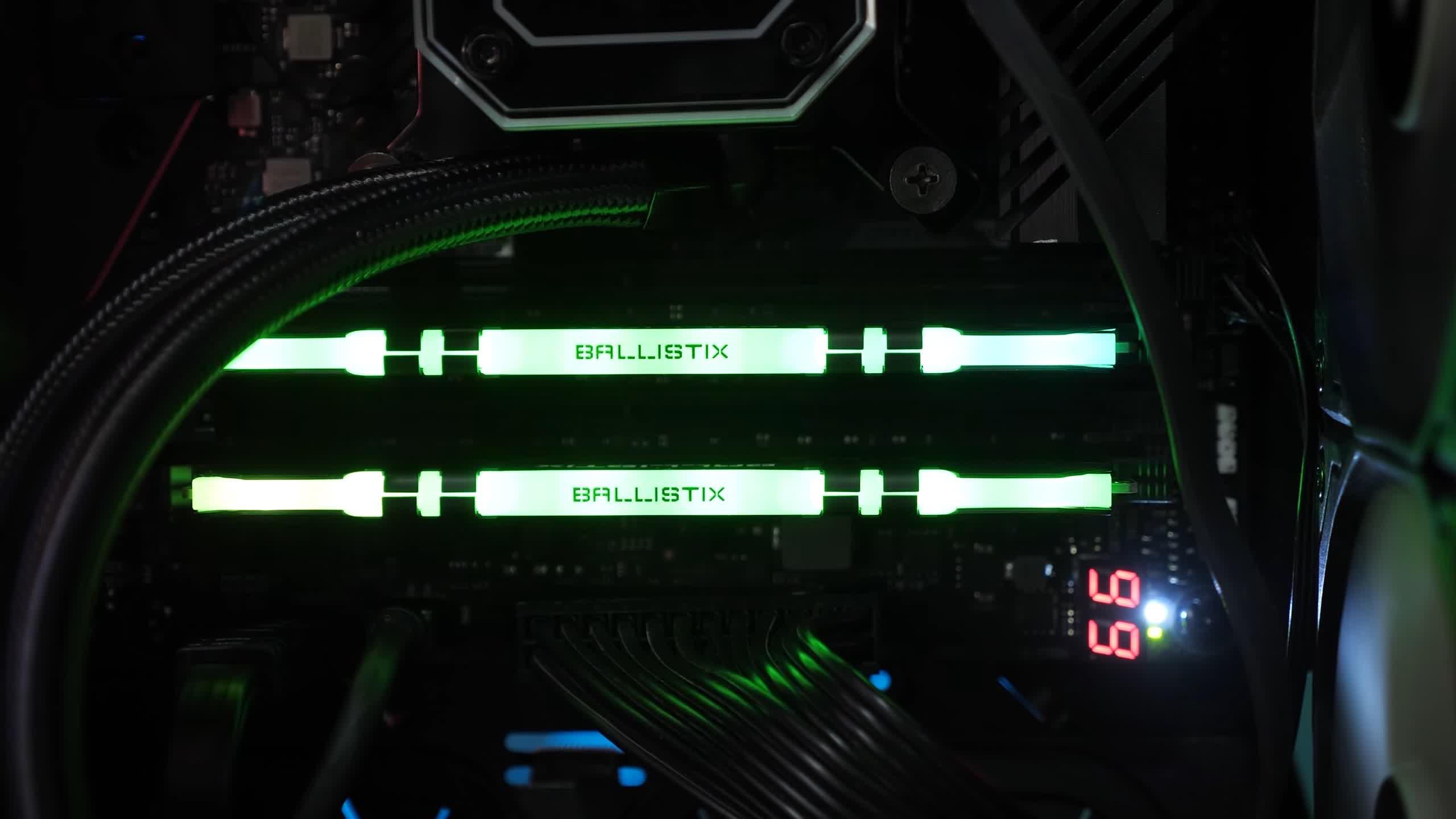
As for the testing itself we're going to look at application, gaming, storage and load time performance. All results are based on a 3 run average and in some instances we powered down the entire system between runs to avoid cached results. Okay let's get into the results.
Cache and Memory Latency Performance
Before we jump into the application benchmarks here's a quick look at cache and memory latency performance. In short we see no change, or virtually no change in L1, L2 or L3 cache performance with the Intel processors. Where we do see a notable performance difference is when looking at DRAM latency...
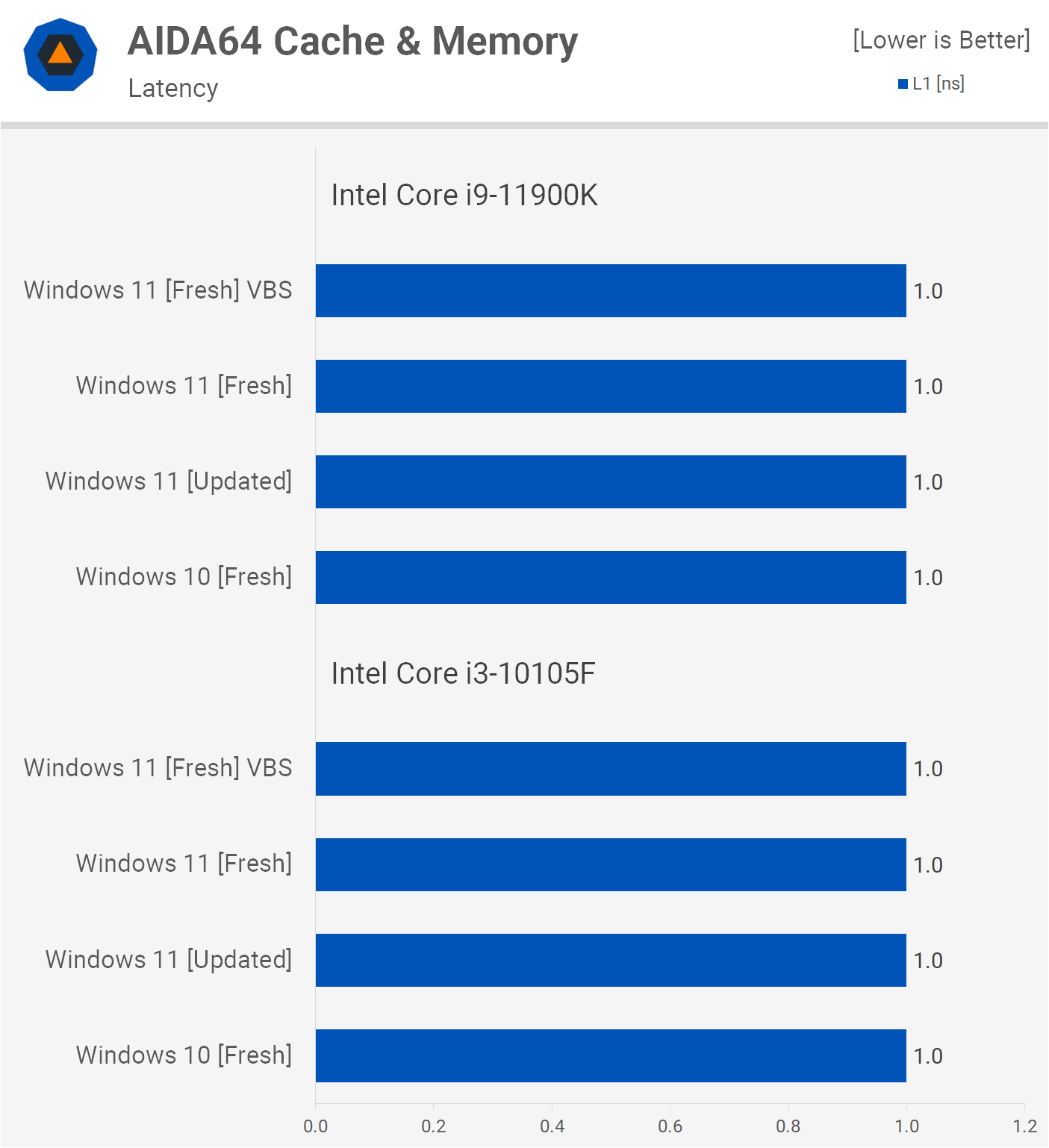
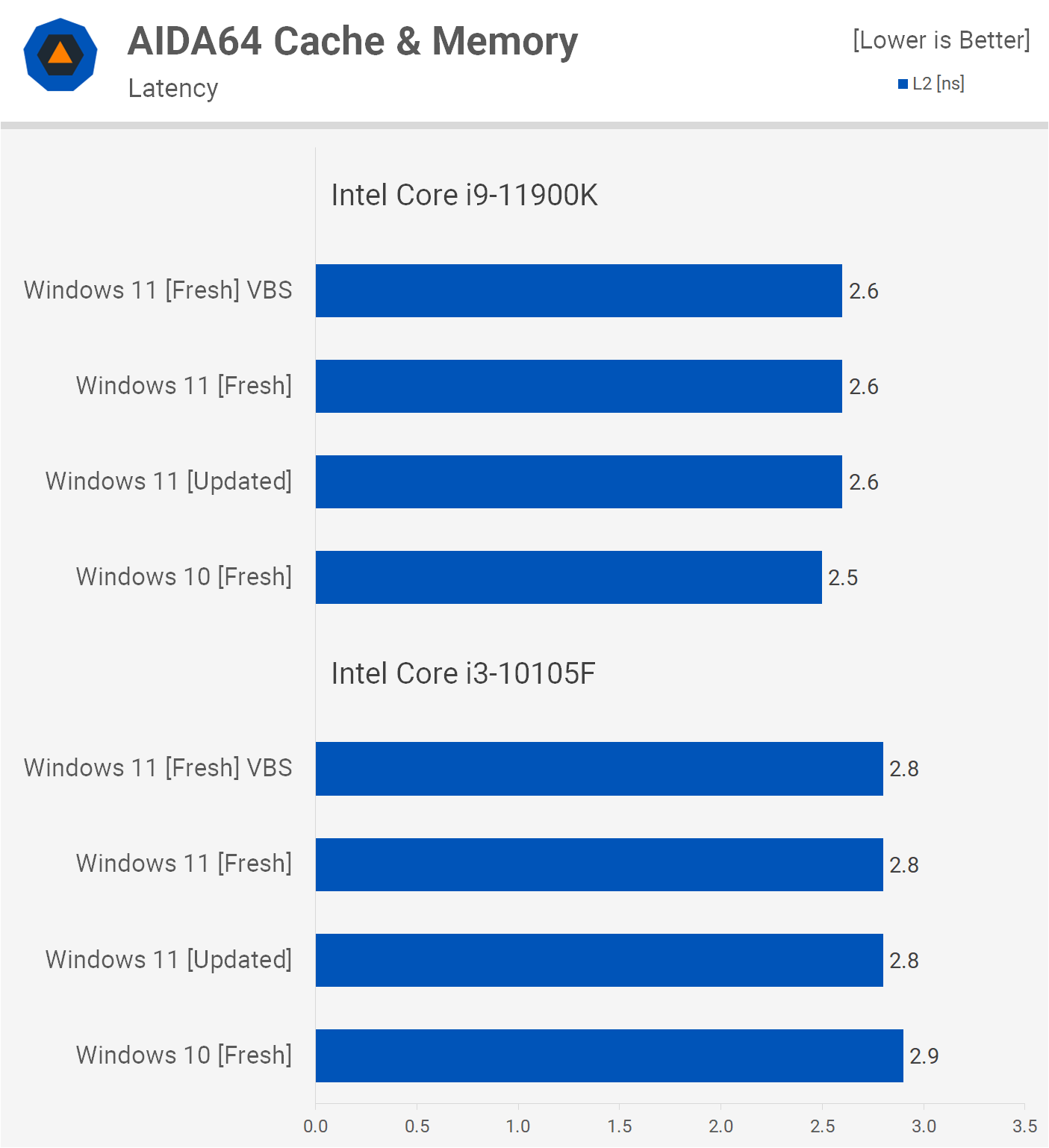
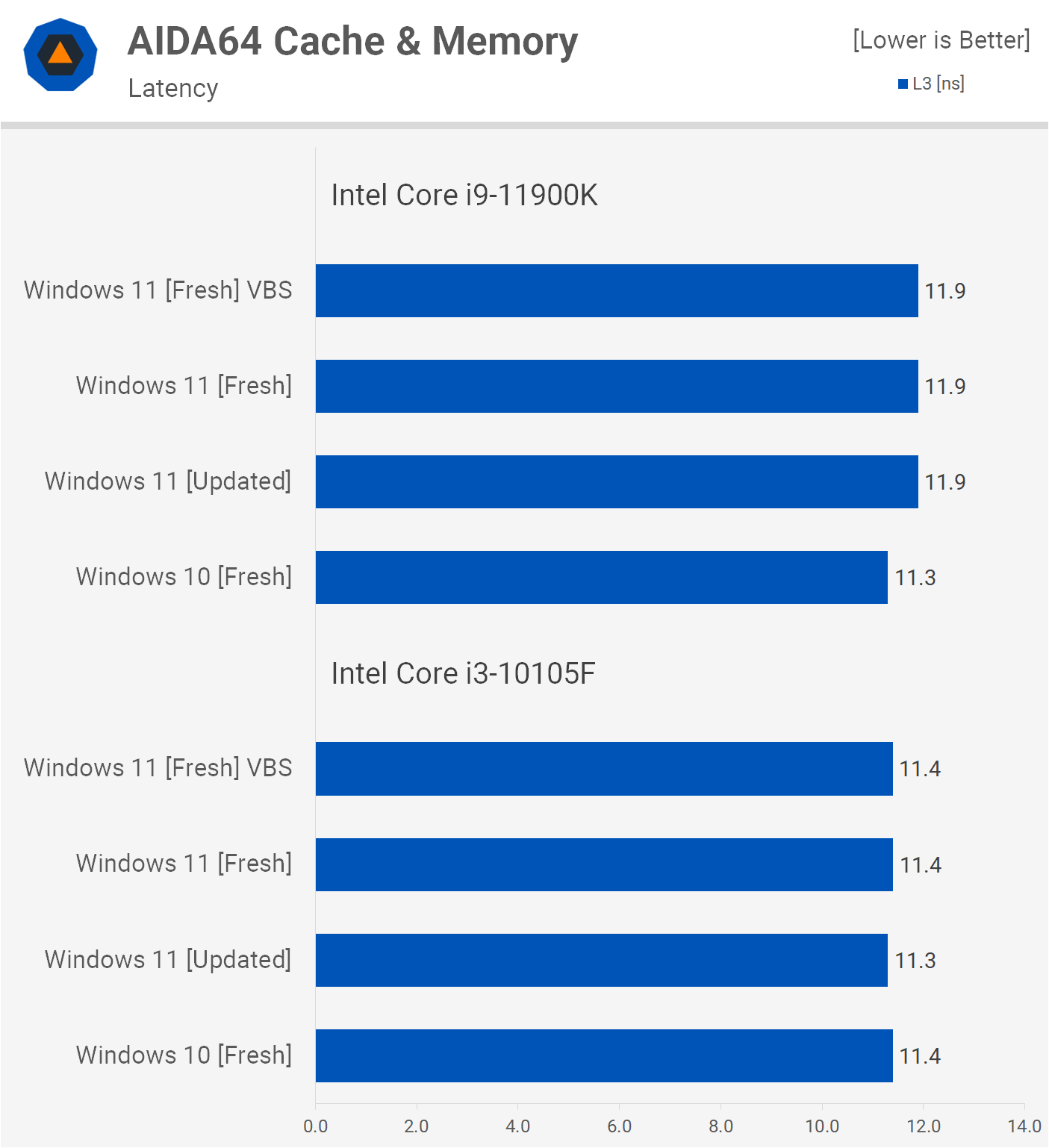
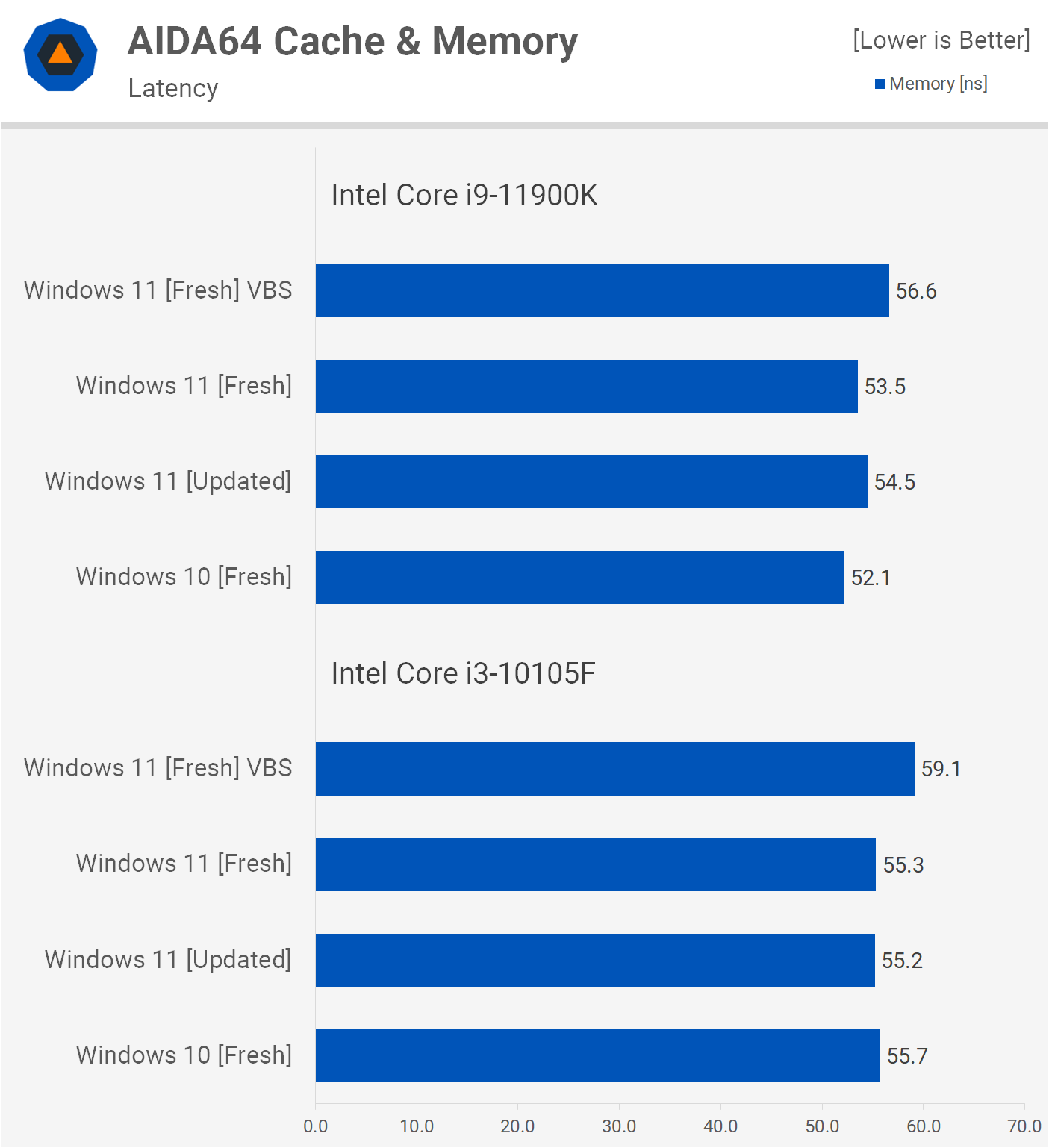
For the 10105F, the Windows 10 and Windows 11 installs deliver the same results, but enabling VBS does incur a 7% performance penalty and this will be noticed in memory-sensitive scenarios, such as gaming.
With the more powerful 11900K, we see that Windows 10 delivered the best results as the upgrade to Windows 11 increased latency by 5%, though a fresh Windows 11 install only increased latency by 3%. However, we're again seeing a noteworthy increase with VBS enabled, this time a 9% increase is seen when compared to the Windows 10 configuration.
Application Benchmarks
Moving on to Cinebench R23, we find that the 11900K produced its best result with Windows 10 though the difference is minimal, about a 1% increase over the fresh Windows 11 install. Enabling VBS had a very minor impact on performance at 2%, with the variation between the slowest and fastest configurations, and the same is also true for the Core i3 system.
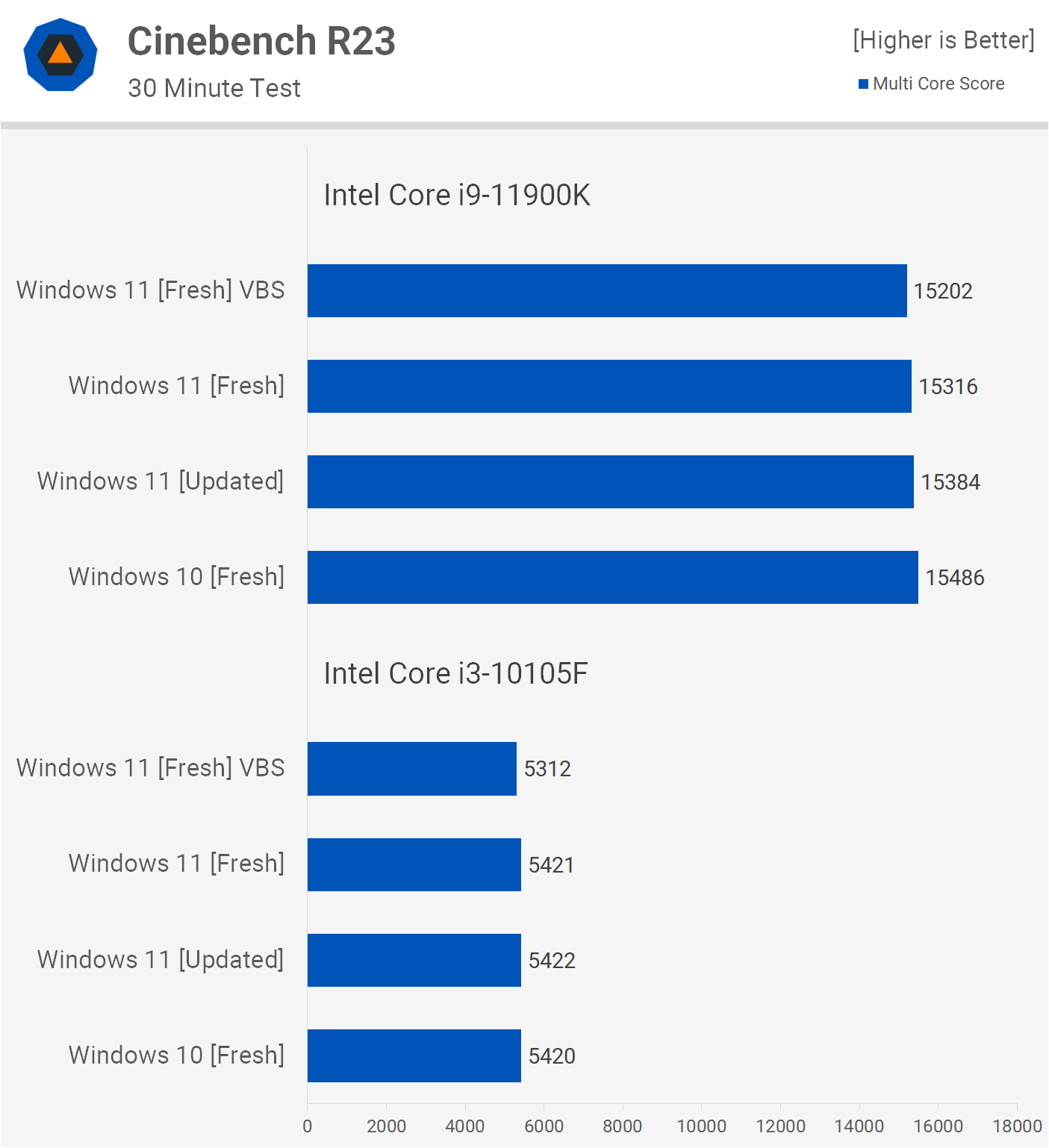
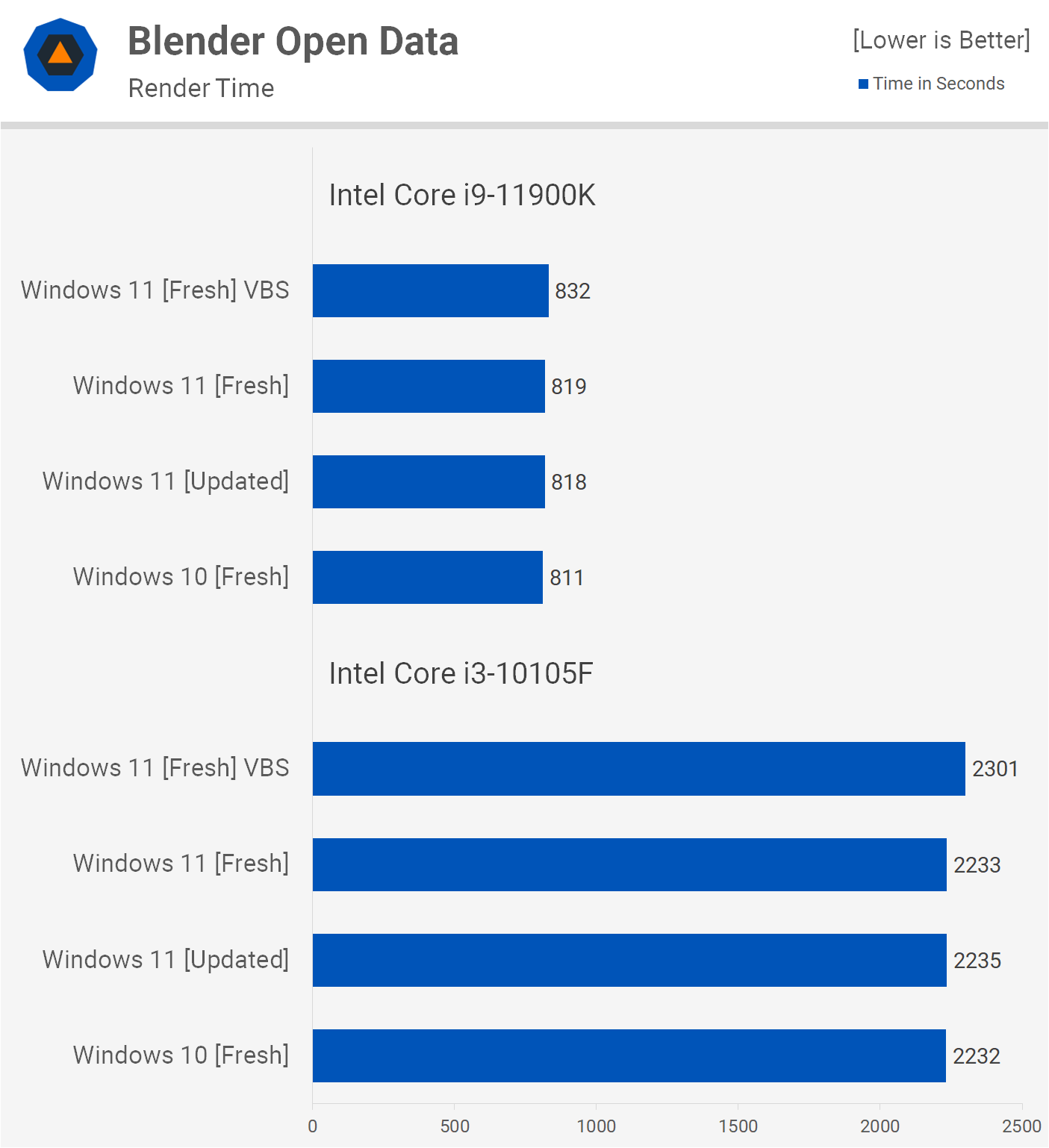
The Blender Open Data is very similar to what was seen with Cinebench. The Windows 10 and Windows 11 results are essentially identical, but enabling VBS comes with a slight performance penalty, this time around 3% when compared to what we saw when using Windows 10.
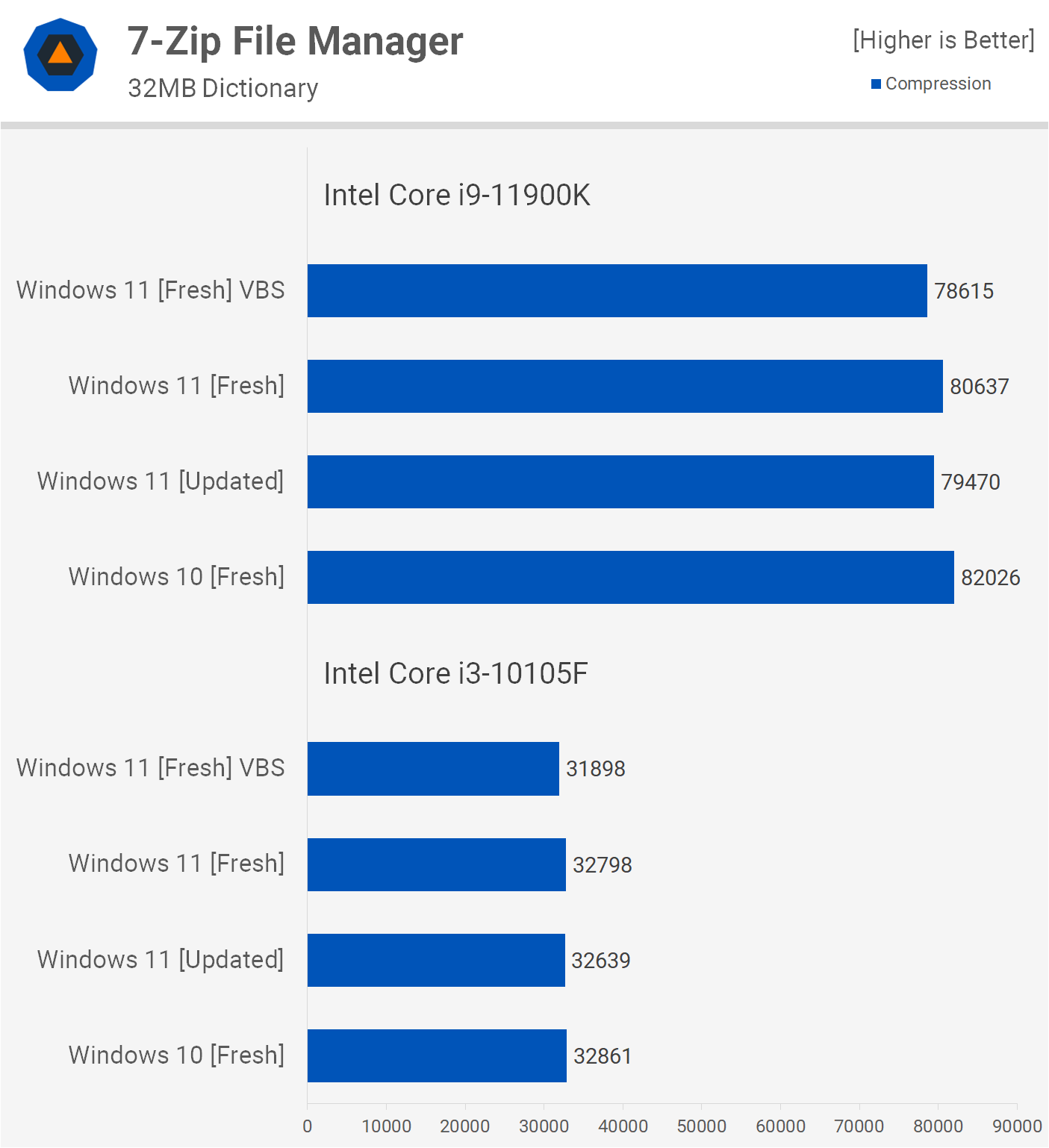
Moving on to the 7-Zip File Manager results we see that for the most part the Core i3 processor is able to deliver the same level of performance using Windows 10 or 11, with the VBS enabled Windows 11 configuration being the only exception as performance dropped 3%.
The margins were slightly larger with the 11900K and we found that Windows 10 provided the best results. Upgrading the Windows 10 install to Windows 11 reduced performance by 3% and a fresh install restored some of that. Then when comparing the fresh Windows 11 install with VBS enabled we again saw a 3% performance hit.
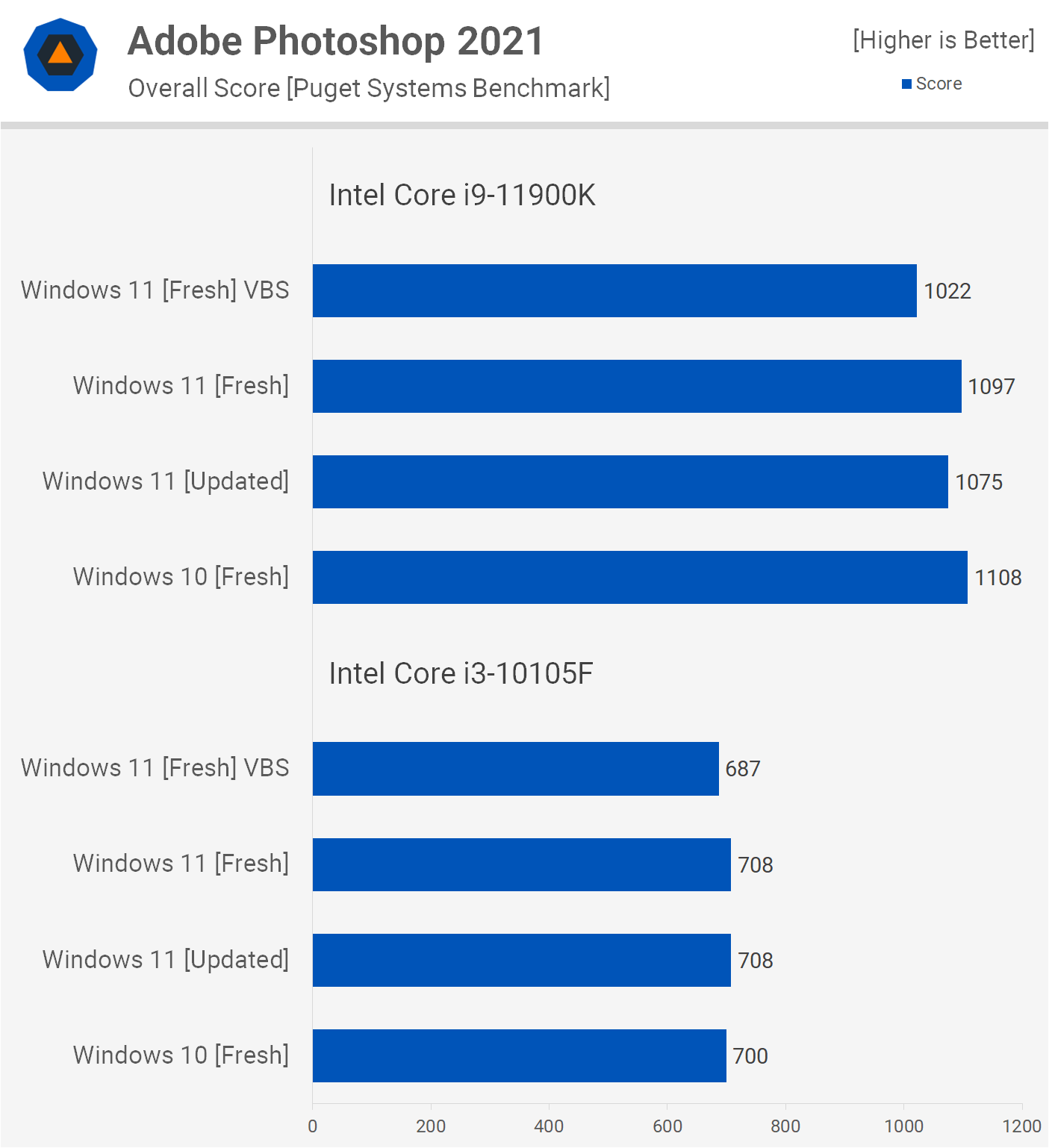
Testing with Adobe Photoshop 2021 shows similar performance for all four tested configurations when using the Core i3 processor and enabling VBS resulted in a 3% performance hit.
That said, we saw a far more significant 7% performance drop with the 11900K when using VBS. However, when comparing the fresh Windows 10 and 11 installs performance was much the same.

Both the Core i3 and Core i9 parts delivered the same performance using either Windows 10 or 11 in the Adobe After Effects benchmark, though this time we see a significant 10% performance drop with VBS enabled.
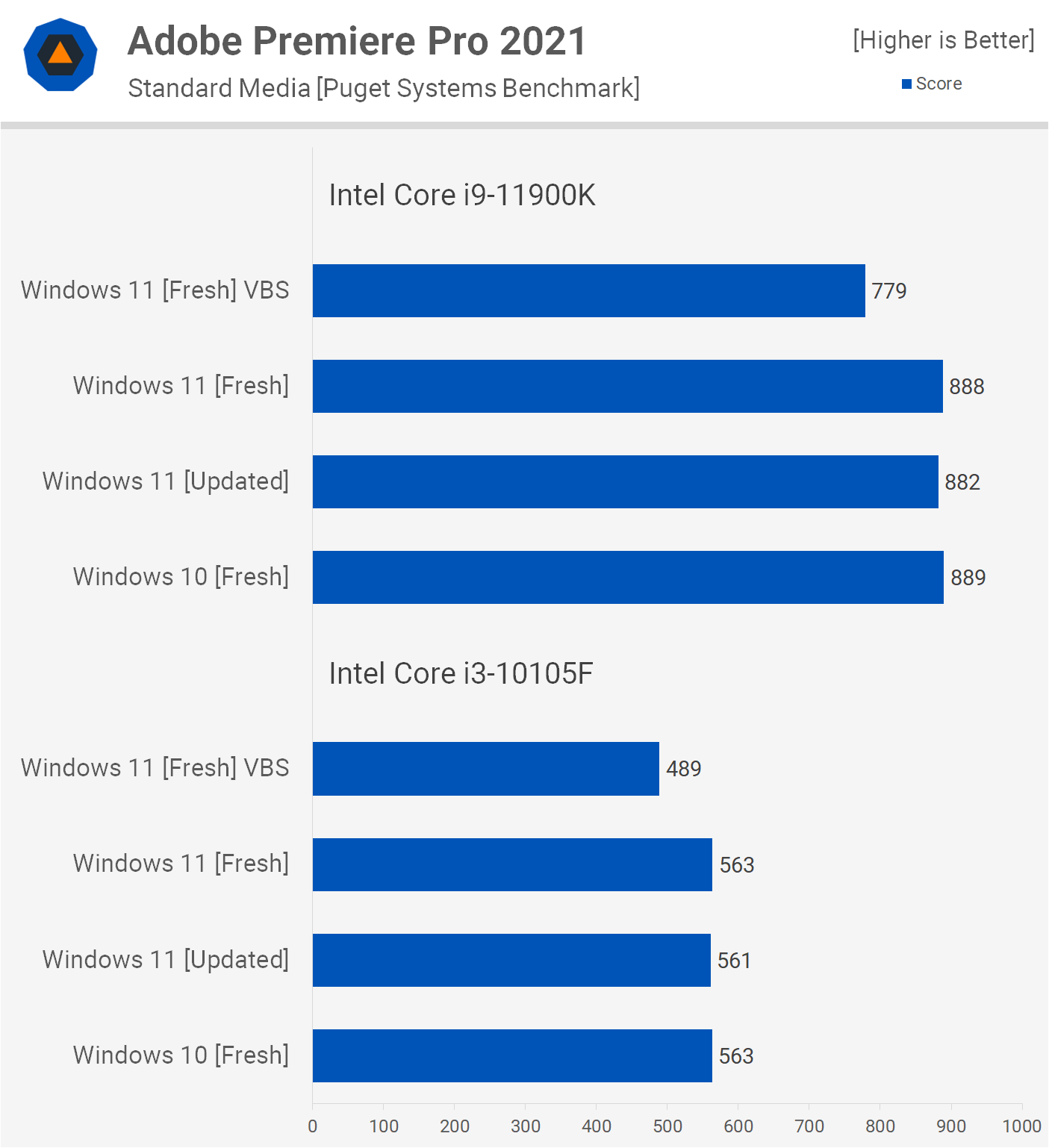
The last application benchmark is based on Adobe Premiere Pro and we're looking at virtually identical performance using Windows 10 or 11. The only exception is the VBS enabled config as this reduces performance by 12-13%.
Gaming Benchmarks
Time for a few game benchmarks. Please note we're not testing dozens upon dozens of games, rather you get the idea with just a few, so we're going to show the results for four titles, starting with F1 2021.

Using the Core i9-11900K we see that the fresh installs of Windows 10 and 11 delivered the same performance. Updating the Windows 10 install to 11 wasn't as fast, but we're talking extremely small margins of difference here.
Those margins were slightly increased with the Core i3 part, and Windows 10 did offer the best result by just 3%.

Rainbow Six Siege results are interesting as VBS reduced frame rates by 11-12%, though that margin is likely exaggerated due to the extremely high frame rates. Those results aside we see identical performance from Windows 10 and Windows 11 using either CPU.
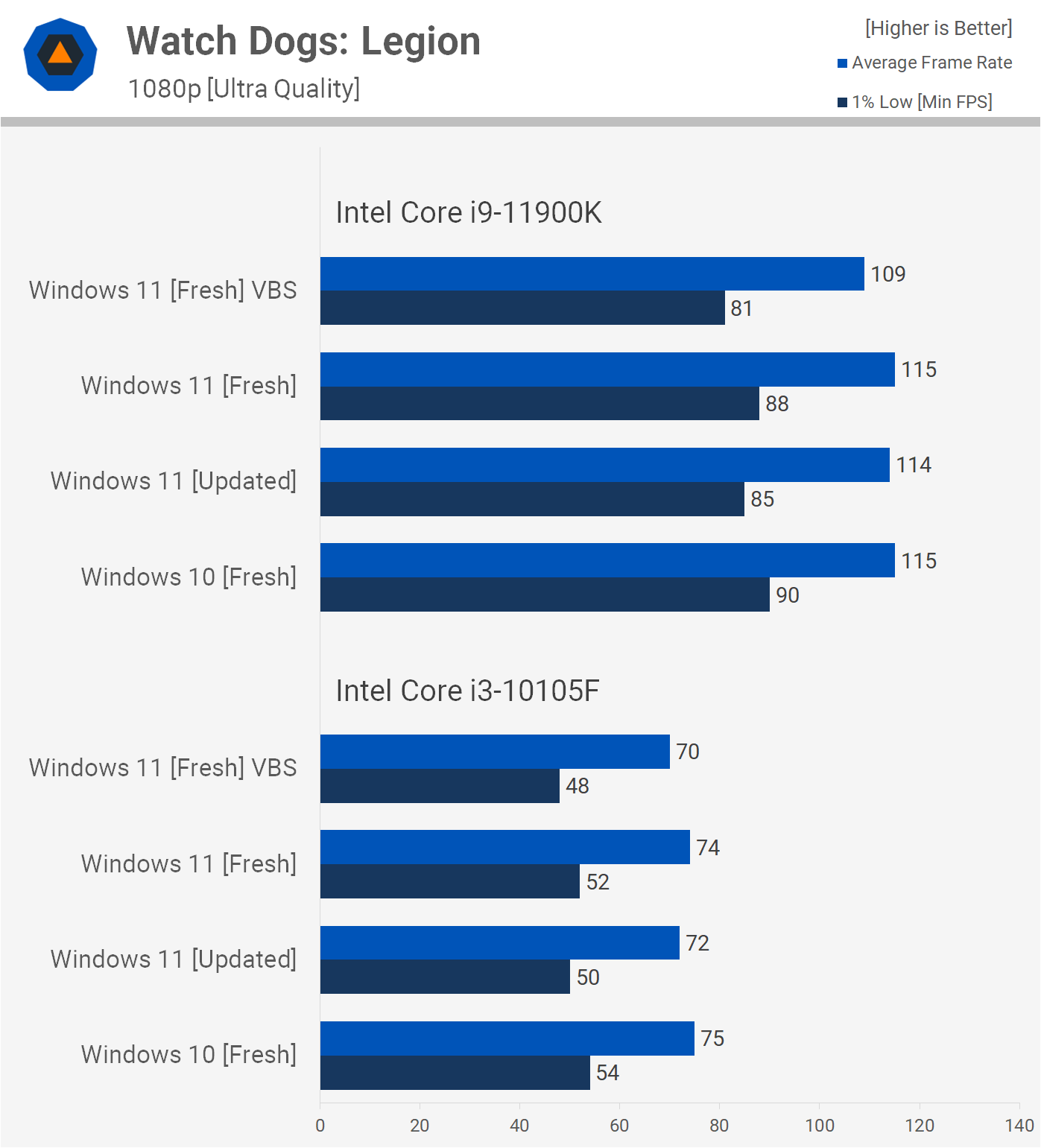
Enabling VBS reduced performance in Watch Dogs: Legion by up to 8%, seen when looking at the 1% low figures. That aside, the fresh Windows 10 and 11 installs delivered the same results while there was a very small performance hit when simply upgrading 10 to 11.
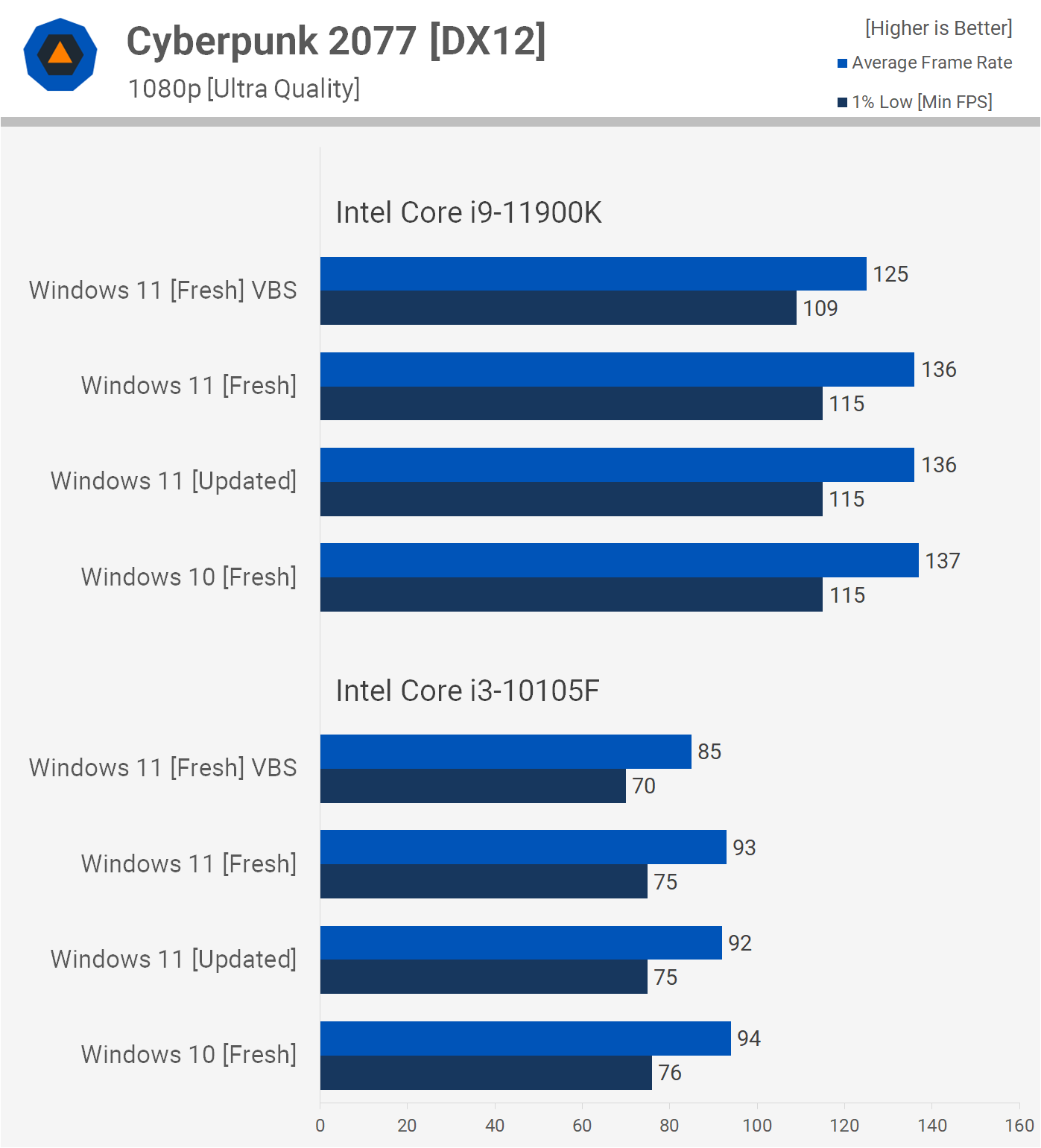
The last game we tested was Cyberpunk 2077 and here we're looking at a ~8% performance hit with VBS installed. Other than that, performance is the same when comparing Windows 10 and 11.
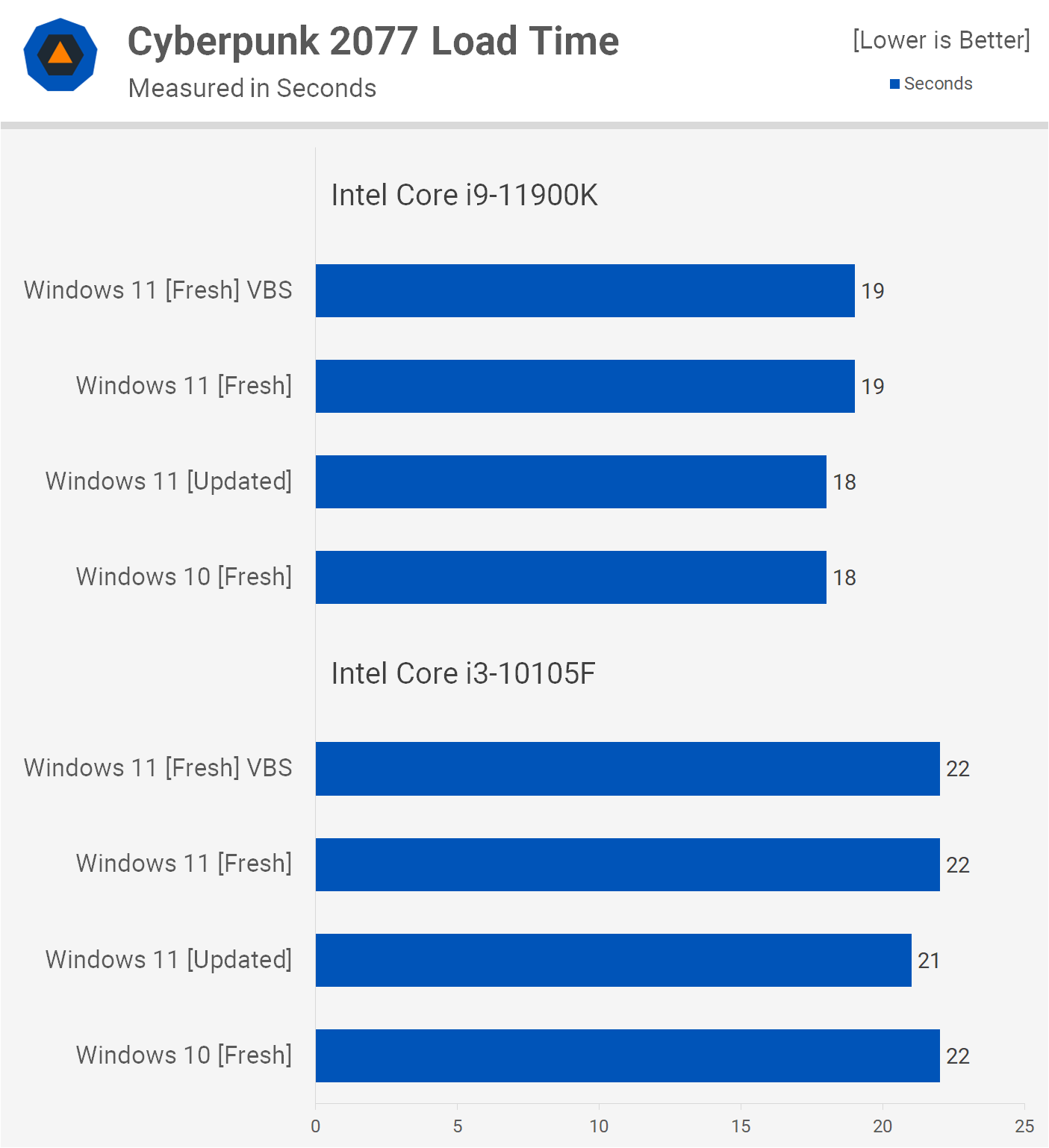
Here's a look at Cyberpunk 2077 level load times using the TeamGroup 8TB NVMe SSD and here we're looking at no more than a 1 second difference between the various configurations, so Windows 11 won't speed up load times of today's games.
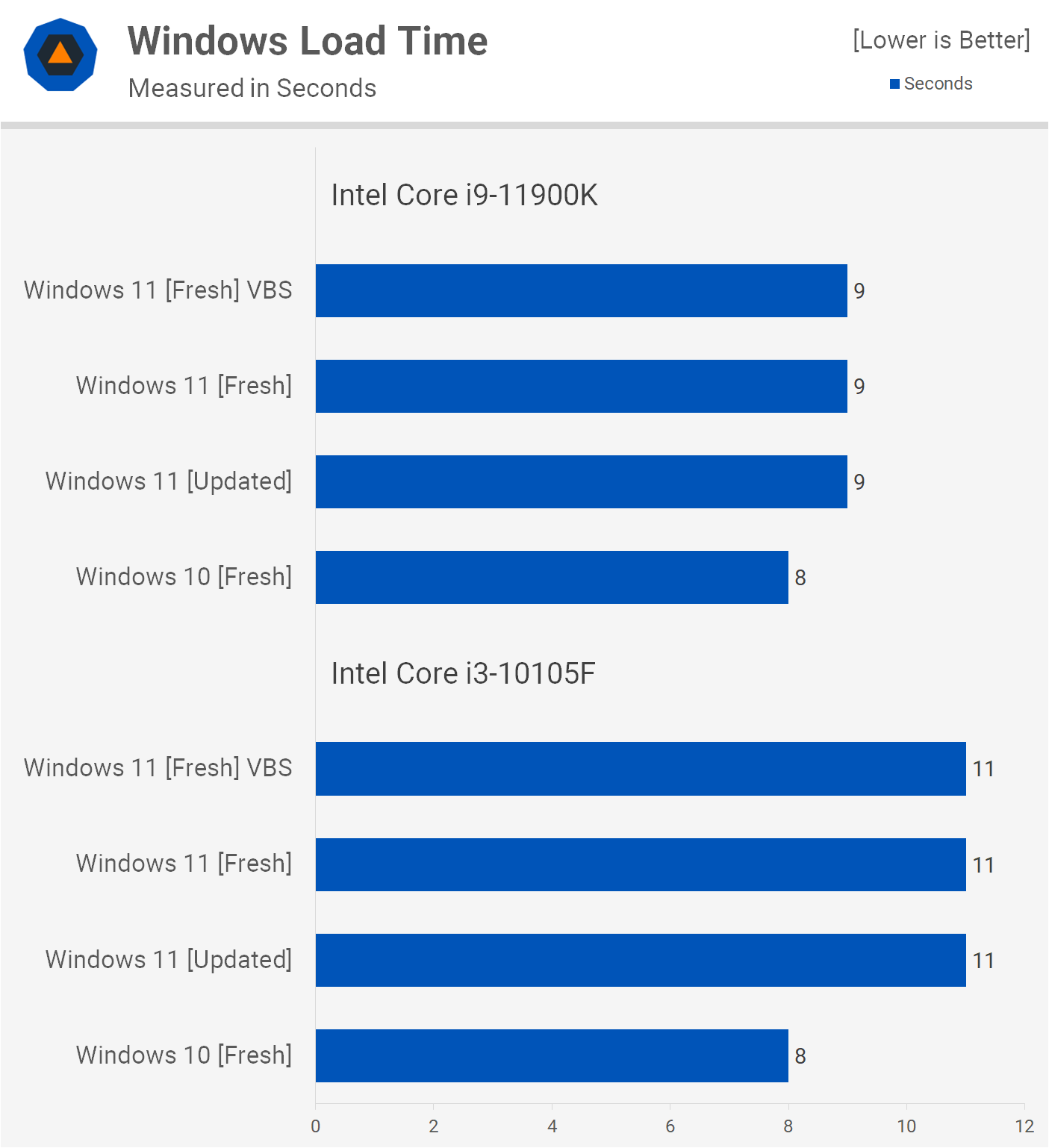
Interestingly, Windows 11 was also slower to load when compared to Windows 10, though the margin when running the 11900K is insignificant. Where the difference was somewhat more significant was with the Core i3 processor as Windows 11 took almost 40% longer to load, though that's a mere 3 second change. Still for our configuration Windows 11 didn't improve boot times.
Storage Performance
Before wrapping up testing, here's a look at storage performance with CrystalDiskMark. Read and write sequential performance is the same regardless of the configuration, so nothing to report here. However, the random queue depth 32 results are interesting.
Windows 11 is offering a massive increase in write performance over Windows 10. To be entirely honest, I'm no longer familiar with SSD testing and I haven't run CrystalDiskMark in years, but I can tell you after multiple system resets the results were repeatable and I did completely fill the brand new SSD before I began testing.
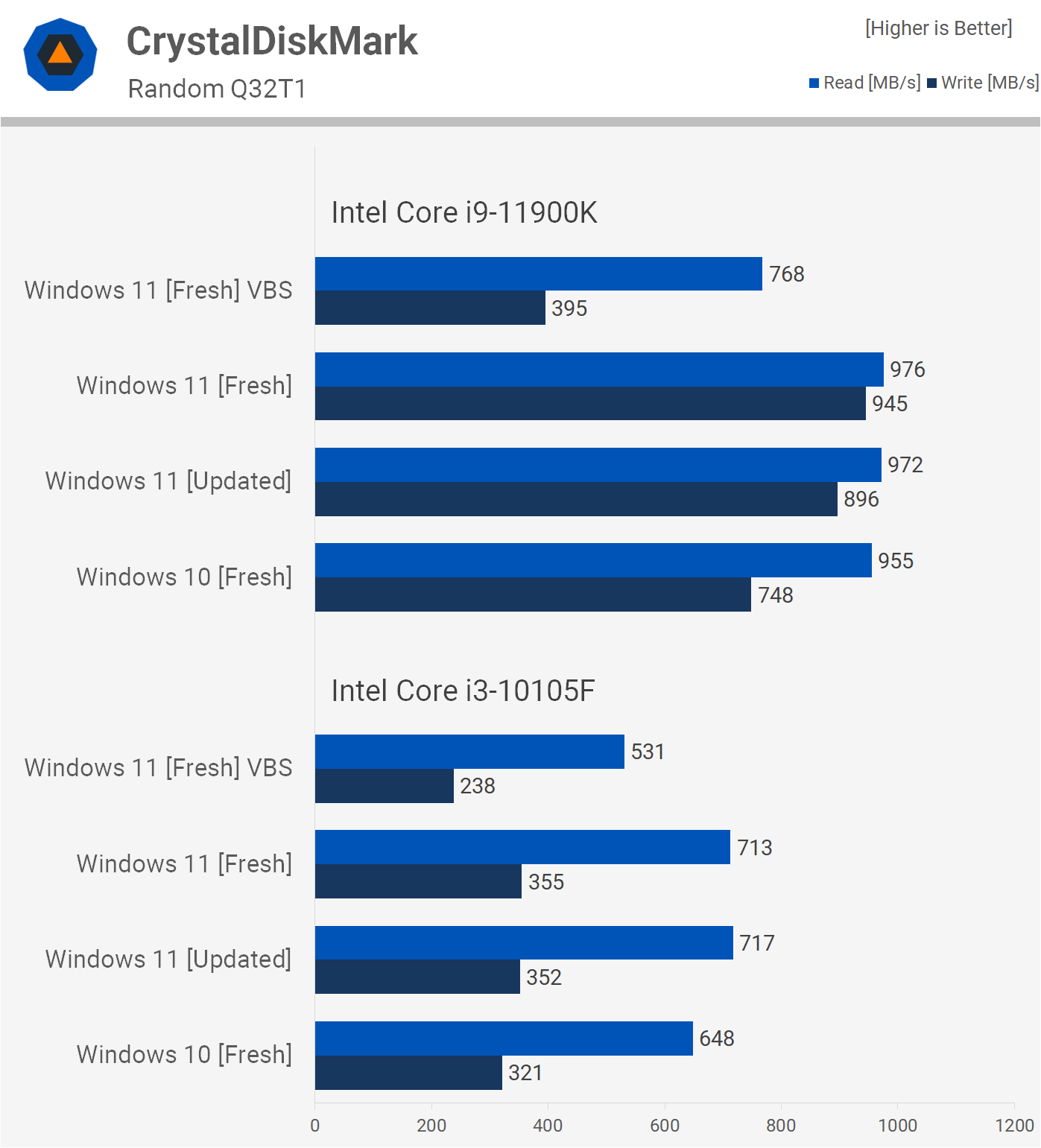
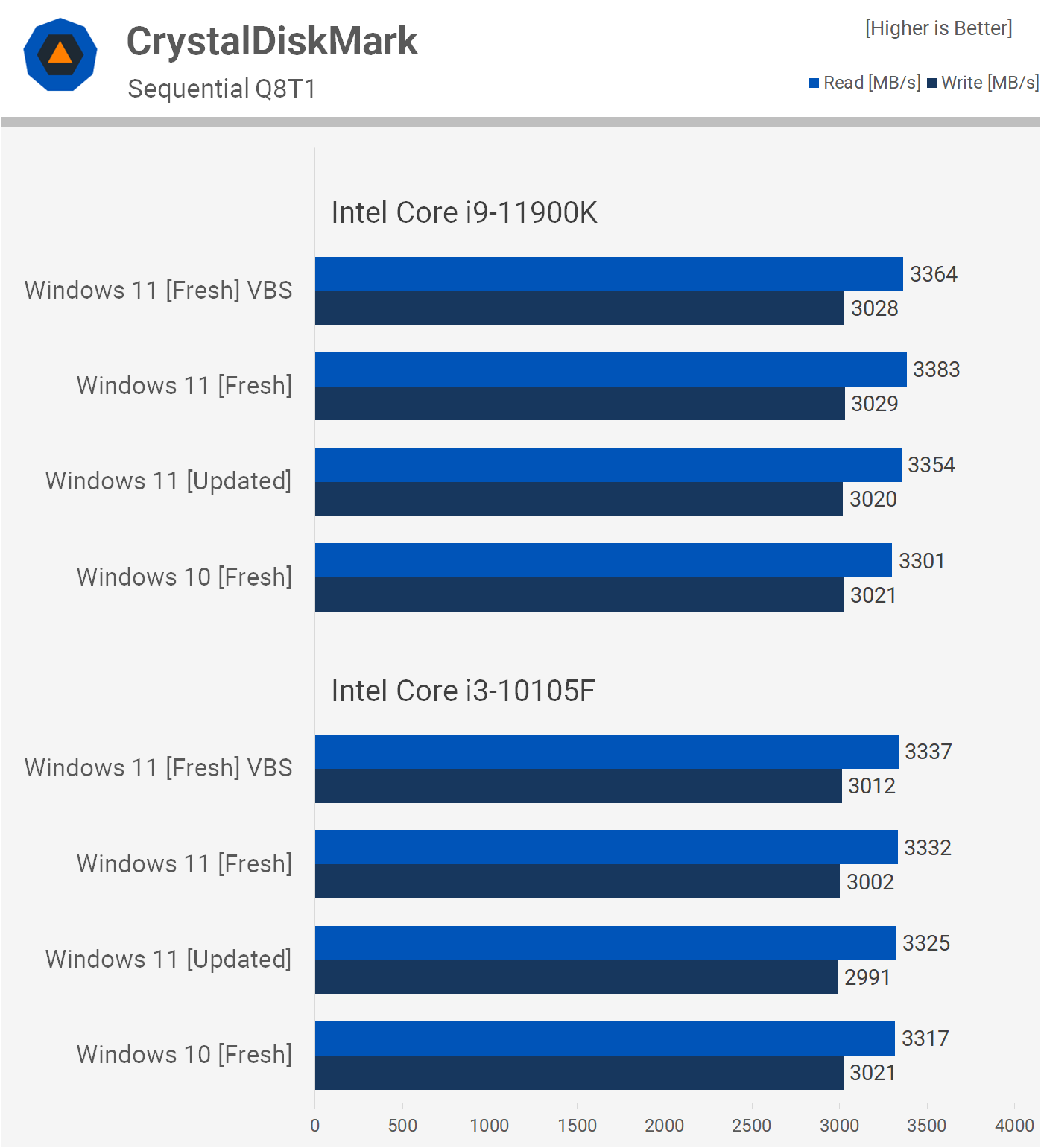
So I believe the 20-26% performance increase we're seeing here with the 11900K is accurate, I'm just not sure why we're seeing such a substantial performance improvement. There was even a 10% uplift from Windows 10 to 11 with the Core i3 processor despite the results being much lower overall.
Another interesting point to note is that VBS cripples storage throughput, lowering both read and write performance. With the 11900K we're looking at a 21% drop for read throughput and a massive 58% drop in write throughput, or another way of putting it, Windows 11's random write performance was almost 2.5x faster with VBS disabled.
What We Learned
There you have it. For the most part there is little to no difference between Windows 11 and Windows 10 using Intel 10th and 11th-gen Core series processors across gaming, application, and storage performance. If you've experienced a notable drop in performance since upgrading, it's well worth checking to see if VBS is enabled and do something about that as we explained in the intro.
It's also worth noting that for maximum performance you're better off starting over with a fresh install of Windows 11. Besides the small performance loss that was seen with the upgraded install, we also on occasion randomly suffered blue screen crashes when loading Windows 11, something that never happened with the fresh install.
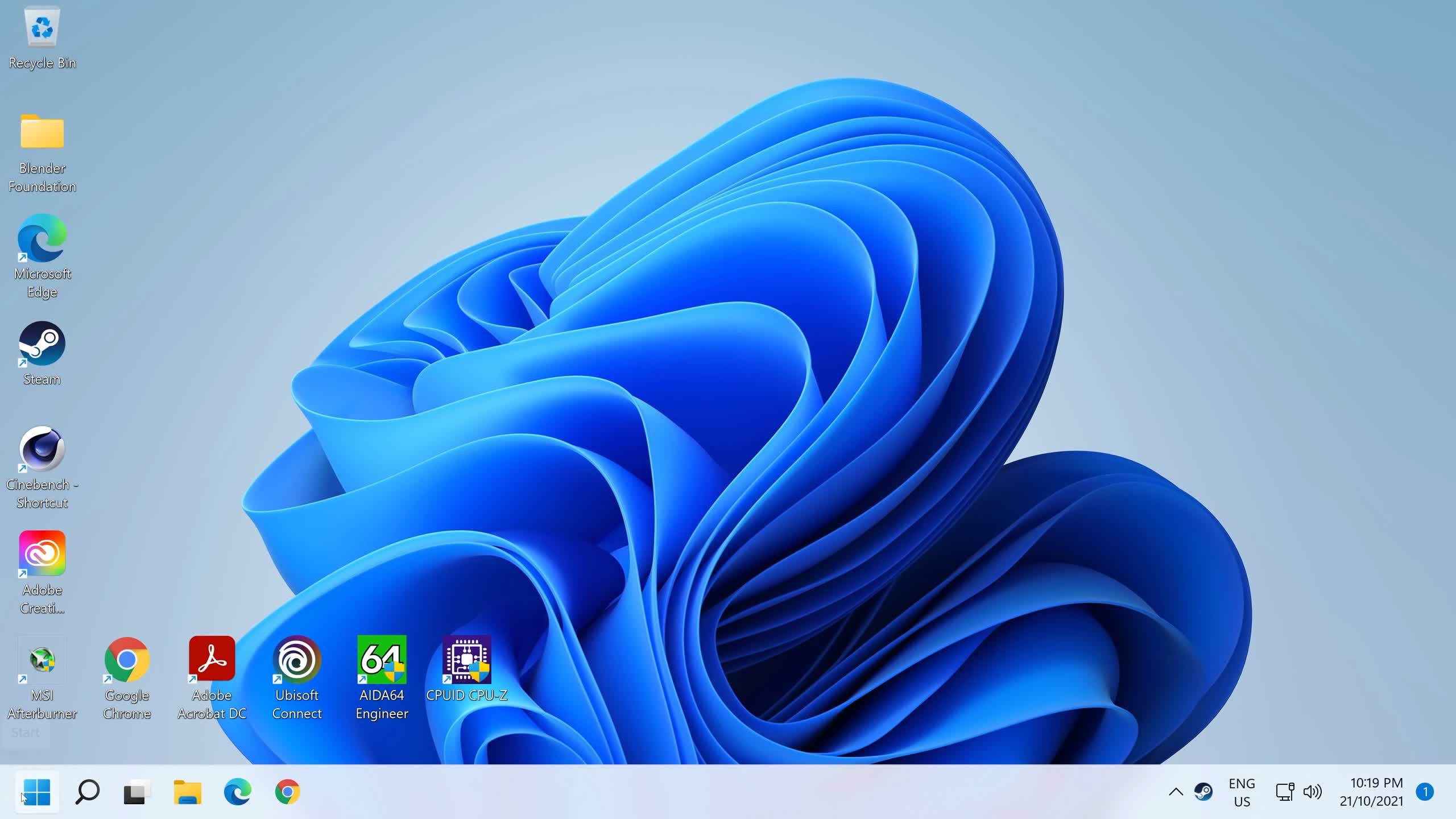
As always, the upgrade procedure is more convenient and we have systems that are running fine this way, but if you're suffering from stability issues after upgrading, there's a good chance that process is the source of your troubles.
In a nutshell, Windows 11 offers no real performance advantage over Windows 10 with perhaps the only exception being random read/write storage performance, but we won't know if this was limited to our test configuration or not until we conduct further testing. On that note, we're keen to see what Windows 11 does for Intel's upcoming Alder Lake CPUs, as well as a look at Ryzen which recently received a patch that addresses L3 cache performance issues.
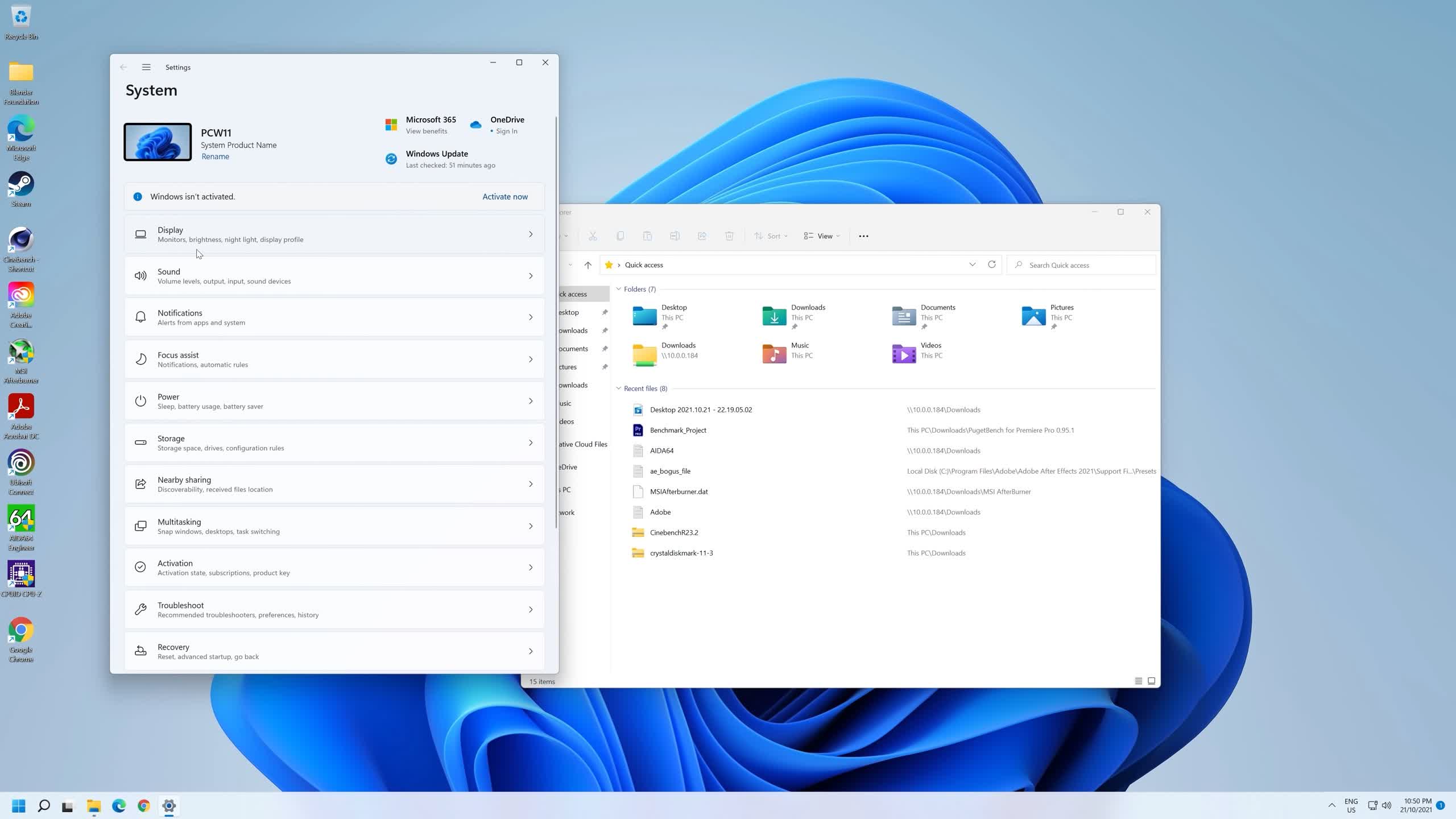
On that note, we'll be primarily testing Alder Lake using Windows 11 for our day-one review while sticking with the Windows 10 data we have for all older platforms, including Ryzen. We've just found that won't place the 10th and 11th-gen Core series processors at a disadvantage, so with that we're going to wrap this one up and move on to testing some upcoming Intel CPUs for an upcoming review very soon.